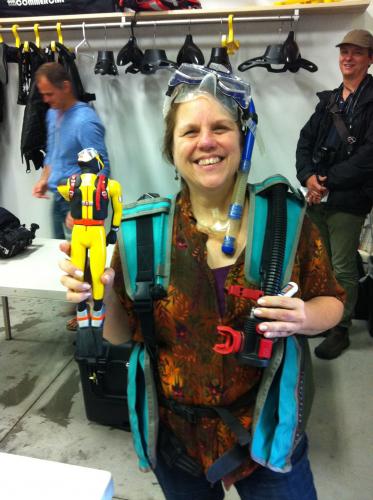Summer vacation finds teachers exploring fisheries, geology, and maritime history (Part 3)
Lake Huron educators experience Great Lakes fisheries, shipwrecks, and ancient ocean fossils offering opportunities to promote inquiry, science, and stewardship learning with their students.

Great Lakes fish, Lake Huron shipwrecks, and ancient ocean fossils—all great excuses to get excited about learning, engage in environmental stewardship projects with your community, and explore careers in Great Lakes science. These are some of the things that twenty teachers participating in the 2014 Lake Huron Place-Based Education Teacher Institute experienced this summer in northeast Michigan, and now hope to share with their students in the new school year.
Science learning, place-based education, and enthusiastic educators equal an invaluable opportunity to promote, through student learning, Great Lakes literacy—a better understanding of the Great Lakes and our interconnections with these water resources. Teachers participating from across the Lake Huron watershed, representing the Northeast Michigan Great Lakes Stewardship Initiative (NEMIGLSI) and Southeast Michigan Stewardship Coalition (SEMIS) networks, spent a portion of this experience exploring a variety of Great Lakes topics alongside science researchers and experts. Highlighting areas of learning teachers were able to dive into:
- Shipwrecks and Maritime Heritage: Research and education experts from the NOAA Thunder Bay National Marine Sanctuary helped teachers dive into maritime heritage. Exploring marine archeology, teachers learned how researchers study history through underwater shipwrecks. They also gained educational information, resources, and activities that they can share.
- Great Lakes Fisheries: Teachers explored the changing ecosystem of Lake Huron with fisheries scientists from U.S. Fish and Wildlife Service and Michigan Sea Grant. Teachers learned about Great Lakes fish species, food webs, diverse fishing values, and how these are affected by issues of water quality, habitat change, and invasive species. Teachers were introduced to fisheries sampling gear, and applied science and math to identify and measure fish, sort larval fish, and age fish using fish scales and otoliths (the ‘ear bone’ found inside fish heads).
- Geology: An evening at the Besser Museum for Northeast Michigan offered a dinner discussion around community partnerships in place-based education. It was also a chance for teachers to learn about geology of Michigan, hunt for fossils of ancient Devonian sea life, and experience how a team of Alpena Elementary students contributed to the fossil park exhibit at the museum.
 As schools prepare to open their doors on a new year, these teachers are equipped to integrate Great Lakes literacy learning principles through place-based education experiences with their students. For example, one teacher, John Caplis of Alpena High School, will use this experience to add-value to his Shipwreck Alley course, an earth science class that centers on the Great Lakes and the NOAA Thunder Bay National Marine Sanctuary. This year, his students will work with Michigan Sea Grant to learn about Great Lakes fisheries. Then, partnering with the Besser Museum for Northeast Michigan, students will interview commercial fisherman to promote the commercial fishing heritage of the region and contribute to an educational exhibit interpreting the historic gill net fishing tug, Kathryn V.
As schools prepare to open their doors on a new year, these teachers are equipped to integrate Great Lakes literacy learning principles through place-based education experiences with their students. For example, one teacher, John Caplis of Alpena High School, will use this experience to add-value to his Shipwreck Alley course, an earth science class that centers on the Great Lakes and the NOAA Thunder Bay National Marine Sanctuary. This year, his students will work with Michigan Sea Grant to learn about Great Lakes fisheries. Then, partnering with the Besser Museum for Northeast Michigan, students will interview commercial fisherman to promote the commercial fishing heritage of the region and contribute to an educational exhibit interpreting the historic gill net fishing tug, Kathryn V.
Caplis reflected on his workshop experience, appreciating how Great Lakes researchers, passionate about their careers and fields of study, can use any topic to teach any skill or curricular topic—from science and math to history and writing. Collectively, teachers valued the connections with Great Lakes scientists, enhancing their ideas toward place-based education in the following ways:
- Value in field trips and site visits – getting into the heart of the project in the field with resource experts and the community.
- Having fun, while making a difference – stewardship can be hands-on and fun while meaningful in the contributions to the local community.
- The community reflects a wealth of experts and resources available to educators – facilitate student connections with Great Lakes and natural resources professionals passionate about their work. Providing a great opportunity for students to identify conservation issues and potential projects, learn about careers, and accomplish learning objectives.
- Give students a voice in their learning – engage students in the process of bringing place-based education alive through community connections. Foster a meaningful experience involving students in the process of identifying environmental issues, community opportunities and new place-based stewardship education projects to which they can contribute.
Learn more about place-based education and the Great Lakes Stewardship Initiative network in Michigan online: http://www.glstewardship.org/
Visit the Center for Great Lakes Literacy to learn more about future workshop opportunities available to teachers: http://www.cgll.org/



 Print
Print Email
Email



